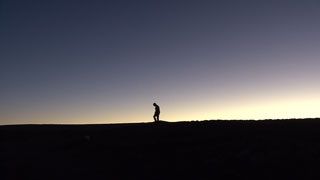Nostalgia for the Light
Nostalgia de la luz FRANCE, GERMANY, CHILE / 2010 / Spanish / Color, B&W / 35mm / 90 min
FRANCE, GERMANY, CHILE / 2010 / Spanish / Color, B&W / 35mm / 90 min
Director, Narration: Patricio Guzmán
Photography: Katell Djian
Editing: Patricio Guzmán, Emmanuelle Joly
Sound: Freddy Gonzalez, Jean-Jacques Quinet
Music: José Miguel Miranda, José Miguel Tobar
Producer: Renate Sachse
Production Company: ATACAMA Productions
World Sales: Pyramide International www.pyramidefilms.com/ . . .
Chile’s Atacama Desert, at an altitude of 3,000 meters, attracts astronomers from around the world. Director Patricio Guzmán talks of his interest in astronomy from an early age while introducing the astronomical mecca of Atacama, and he also reveals that it was a theater for the oppression by Pinochet’s military junta. Time is regarded as eternal in astronomy, but for the families of the junta’s victims who continue to search for the remains of their loved ones, it has come to a standstill. Director Guzmán, who has continued to depict Chilean history in his films, impresses with his striking, resignation-filled narrative and overwhelming visuals.
[Director’s Statement] THE ATACAMA DESERT The desert is a vast, timeless space that is made up of salt and wind. A fragment of planet Mars on planet Earth. Everything there is motionless. And yet this stretch of land is filled with mysterious traces of the past. There are still ruins of villages, 2,000 years old. The trains abandoned in the sand by the 19th-century miners have not moved. There are also some gigantic domes that look like fallen space vessels in which the astronomers live. All around there are human remains. When night falls, the Milky Way is so bright that it projects shadows onto the ground.
THE INVISIBLE PRESENT For an astronomer, the only real time is that which comes from the past. The light of the stars takes hundreds of thousands of years to reach us. That is why astronomers are always looking back, to the past. It’s the same for historians, archaeologists, geologists, paleontologists, and the women who search for their disappeared. They all have something in common: they observe the past in order to be able to better understand the present and future. In the face of the uncertain future, only the past can enlighten us.
INVISIBLE MEMORY Memory guarantees us life, as does the warmth of sunlight. Human beings would be nothing without memory: objects with no pulse, with no beginning and no future. After 18 years of dictatorship, Chile is once again experiencing democracy. But at what price . . . Many have lost their friends, relatives, houses, schools, and universities. And others have lost their memory, perhaps forever.
 Patricio Guzmán
Patricio Guzmán
Patricio Guzmán was born in 1941 in Santiago, Chile. He studied at the Official Film School in Madrid, where he specialized in documentary cinema. In 1973, he filmed The Battle of Chile, a documentary about Allende’s government and its fall. The American magazine Cineaste described it as “one of the ten best political films in the world.” After the coup d’état, Guzmán was arrested and spent two weeks in the Santiago National Stadium, where he was threatened with simulated executions on several occasions. He left the country in 1973 and moved to Cuba, then Spain and France, where he made other films: In the Name of God (1987; on liberation theology during the Chilean dictatorship), The Southern Cross (1992), Barriers of Solitude (1995), Obstinate Memory (1997), The Pinochet Case (2001), Madrid (2002), Salvador Allende (2004), and My Jules Verne (2005). Between 2006 and 2010, he developed Nostalgia for the Light and five short films about astronomy and historical memory. He currently chairs the International Documentary Film Festival in Santiago (FIDOCS), which he founded in 1997. |
